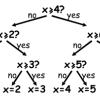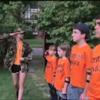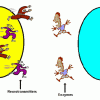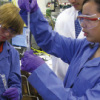Search Results
Showing results 1 to 17 of 17

Twenty Guesses: Information Theory
Source Institutions
This activity introduces the idea that computer scientists measure information by how "surprising" a message is.

Exercise and Memory
Source Institutions
This activity (page 1 of the PDF under SciGirls Activity: Exercise and Memory) is a full inquiry investigation into the effects of exercise on short term memory.

Synaptic Tag
Source Institutions
In this outdoor activity, learners review the parts of the synapse and their functions by playing a game.

Metamorphosis Matching
Source Institutions
This is an activity where learners will compare the different metamorphosis stages of amphibians.

Whose Fault Is It?
Source Institutions
In this seismic simulation, learners play a "who-dunnit" game to explore earthquakes.

Building Bingo
Source Institutions
In this on site "field trip" activity (located on pages 6-9 of PDF), learners get hands-on experience identifying building materials by playing "Building Bingo".
How Many In a Minute
Source Institutions
In this activity, learners will keep track of how much they can do in one minute. Instructors can pick something everyone will do for a minute, such as jumping up and down or drawing stars.

Buzz Lightyear Connect It!: Flight Path Activity
Source Institutions
In this activity, "space cadets" (learners) use writing and sequencing skills in addition to directional words/ordered pairs to guide Buzz Lightyear (from the movie "Toy Story") through a grid to reac
Fish Family Identification
Source Institutions
In this game, students will become familiar with fish shapes, learn that fish within a given taxonomic family have similar body shapes, and discuss how different body shapes enable fish to survive in

The Carbon Cycle: How It Works
Source Institutions
In this game, learners walk through an imaginary Carbon Cycle and explore the ways in which carbon is stored in reservoirs and the processes that transport the carbon atom from one location to another

Neuron Chain Tag
Source Institutions
In this outdoor activity, learners play a game of Tag to discover how neurons attach themselves to each other to form a chain.

The Carbon Cycle: Carbon Tracker
Source Institutions
In this activity, learners play NOAA's Carbon Tracker game and discover ways to keep track of carbon dioxide and other greenhouse gases in the world.

Probability: Remove One
Source Institutions
In this math lesson, learners are given 15 chips and a number line labeled from 2-12.

Population Study Game: Oh, Deer!
Source Institutions
In this activity, learners model a population of deer and see how the number of deer changes over time.

Artificial Intelligence: The Intelligent Piece of Paper
Source Institutions
This activity explores what it means for a computer to be intelligent and introduces the topic of what a computer program is and how everything computers do simply involves following instructions writ

Self-Assembly Game
Source Institutions
This is a quick game about self-assembly (page 2 of PDF under Self-Assembly Activity). Like the molecules of DNA, learners will self-assemble into a pattern by following a simple set of rules.

Rock Cycle Roundabout
Source Institutions
In this activity, learners will learn how igneous rock, metamorphic rock, and sedimentary rock are formed as part of the rock cycle and that the same forces that produce/change rocks also produce/chan
